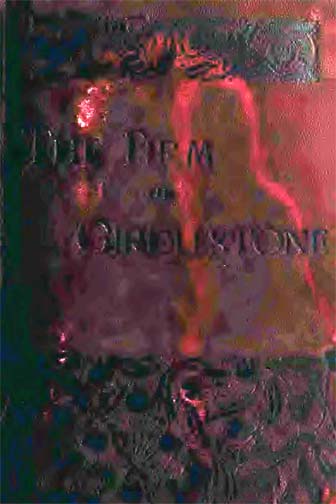
When she awoke in the morning it was some little time before she could realize where she was or recall the events which had made such a sudden change in her life. The bare, cold room, with the whitewashed walls, and the narrow bed upon which she lay, brought back to her the recollection of a hospital ward which she had seen in Edinburgh, and her first thought was that she had had some accident and had been conveyed to some such establishment. The delusion was only momentary, however, for her true situation came back to her at once with all its vague horror. Of the two, she would have preferred that her first impression had been correct.
The small window of her apartment was covered by a dirty muslin blind. She rose and, drawing it aside, looked eagerly out. From what she had seen the night before she had hoped that this prison to which she had been conveyed might make amends for its loneliness by some degree of natural beauty. The scene which now met her eyes soon dispelled any expectations of the sort. The avenue with its trees lay on the other side of the house. From her window nothing was visible but a dreary expanse of bog-land and mudbanks stretching down to the sea. At high tide this enormous waste of dreariness and filth was covered by the water, but at present it lay before her in all its naked hideousness, the very type of dullness and desolation. Here and there a few scattered reeds, or an unhealthy greenish scum upon the mud, gave a touch of colour to the scene; but for the most part the great plain was all of the same sombre mud tint, with its monotony broken only by the white flecks where the swarms of gulls and kittiwakes had settled in the hope of picking up whatever had been left by the receding tide. Away across the broad surface a line of sparkling foam marked the fringe of the ocean, which stretched away to the horizon.
A mile or two to the eastward of her Kate saw some sign of houses, and a blue smoke which flickered up into the air. This she guessed to be the fishing village of Lea Claxton, which the driver had mentioned the night before. She felt, as she gazed at the little hamlet and the masts of the boats in front of it, that she was not alone in the world, and that even in this strange and desolate place there were honest hearts to whom as a last resource she could appeal.
She was still standing at the window when there came a knocking at the door, and she heard the voice of the old woman asking if she were awake. “Breakfast is ready,” she said, “and the master is a-wondering why you bean’t down.”
On this summons Kate hastened her toilet and made her way down the old winding stair to the room in which they had supped the night before. Surely Girdlestone must have had a heart of flint not to be melted by the sight of that fair, fresh face. His features set as hard as adamant as she entered the room, and he looked at her with eyes which were puckered and angry.
“You are late,” he said coldly. “You must remember that you are not in
Eccleston Square. ‘An idle soul shall suffer hunger,’ says the prophet.
You are here to be disciplined, and disciplined you shall be.”
“I am sorry,” she answered. “I think that I must have been tired by our journey.”
The vast room looked even more comfortless and bleak than on the preceding evening. On the table was a plate of ham and eggs. John Girdlestone served out a portion, and pushed it in her direction. She sat down on one of the rough wooden chairs and ate listlessly, wondering how all this was going to end.
After breakfast Girdlestone ordered the old woman out of the room, and, standing in front of the fire with his long legs apart and his hands behind his back, he told her in harsh concise language what his intentions were.
“I had long determined,” he said, “that if you ran counter to my wishes, and persisted in your infatuated affection for that scapegrace, I should remove you to some secluded spot, where you might reconsider your conduct and form better resolutions for the future. This country house answered the purpose admirably, and as an old servant of mine, Mrs. Jorrocks, chanced to reside in the neighbourhood, I have warned her that at any time I might come down and should expect to find things ready. Your rash and heartless conduct has, however, precipitated matters, and we have arrived before her preparations were complete. Our future arrangements will therefore be less primitive than they are at present. Here you shall remain, young lady, until you show signs of repentance, and of a willingness to undo the harm which you have done.”
“If you mean until I consent to marry your son, then I shall live and die here,” the girl said bravely.
“That rests with yourself. As I said before, you are under discipline here, and you may not find existence such a bed of roses as it was in Eccleston Square.”
“Can I have my maid?” Kate asked. “I can hardly stay here with no one but the old woman in the house.”
“Rebecca is coming down. I had a telegram from Ezra to that effect, and he will himself join us for a day or two in each week.”
“Ezra here!” Kate cried in horror. Her chief consolation through all her troubles had been that there seemed to be some chance of getting rid of her terrible suitor.
“And why not?” the old man asked angrily. “Are you so bitter against the lad as to grudge him the society of his own father?”
Kate was saved from further reproaches by the entrance of the old woman to clear the table. The last item of intelligence, however, had given her a terrible shock, and at the same time had filled her with astonishment. What could the fast-living, comfort-seeking man about town want in this dreary abode? She knew Ezra well, and was sure that he was not a man to alter his ways of life or suffer discomfort of any kind without some very definite object. It seemed to her that this was a new mesh in the net which was being drawn round her.


